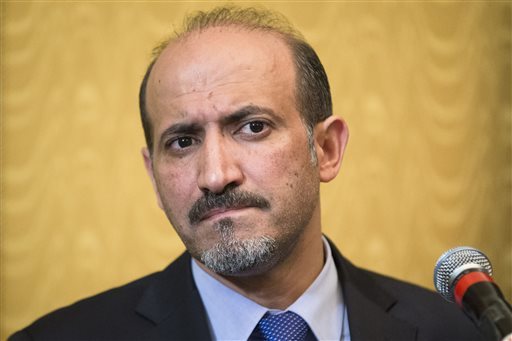While Bashar al-Assad's military continues to consolidate its position in strategically important areas of central Syria, the Syrian Opposition Coalition is trying to counteract the regime's advances with a campaign of its own -- in Washington.
Beginning Wednesday, April 7, SNC President Ahmad al-Jarba, chief of staff Gen. Abdul-Ilah al-Bashir -- the top military official in the Supreme Military Council -- and top SNC diplomat Hadi al-Bahra will visit the U.S. capital city and meet with some very powerful people on both sides of Pennsylvania Avenue. The opposition delegation will be sitting down with National Security Adviser Susan Rice, Secretary of State John Kerry, and President Obama himself -- in addition to other administration officials in the State Department -- in an attempt to drill home the message that the SNC is not only a legitimate representative of the Syrian people, but a leadership team that deserves far more military and political support from the West than it's currently getting.
Despite a White House pledge for another $27 million in food, medicine, body armor, and communications gear to the Syrian Military Council this week, the Obama administration's policy on the Syrian civil war remains on the passive side of the ledger -- at least when it comes to the provision of military equipment, weapons, and ammunition to the moderate rebels trying to unseat Bashar al-Assad and his regime. Reports of anti-tank TOW missiles being used by moderate rebel battalions in some locations are a welcome change for those fighting on the ground, but even this support is seen by the SNC and its military wing as far too limited to chip away at the regime's control. Ahmad al-Jarba, therefore, will have a tough task ahead of him this week if his primary goal is convincing the White House to embrace a more aggressive and activist Syria war policy.
Jarba and his delegation, however, may have more luck when they meet with senior members of Congress. According to Al-Monitor, Jarba will be sitting down with the chairmen and ranking members of the Senate Foreign Relations and Armed Services Committees, as well as the leadership of the House Foreign Affairs and Armed Services panels. Senator John McCain, by far the Obama administration's biggest critic when it comes to the Syria conflict, will be on the meeting list, as will Senator Dick Durbin, the Senate Majority Whip. The SNC will no doubt press its case for further military assistance in each of those meetings.
Although it's a tired cliché in Washington that the U.S. Congress is too divided and petty to do anything remotely helpful for the American people, the body has been remarkably bipartisan on Syria. President Obama's trouble in gaining the ascent of Congress last summer for his Authorization for the Use of Military Force often overshadows the fact that the two committees responsible for drafting legislation on U.S. foreign policy -- House Foreign Affairs and Senate Foreign Relations -- have been remarkably unified in advocating for more active U.S. involvement.
In May 2013, the Senate Foreign Relations Committee passed the "Syria Transition Support Act" on a bipartisan 15-3 vote that would have given the president the authority to arm vetted Syrian opposition units. Last week, the House Foreign Affairs Committee passed two Syria resolutions with Republican and Democratic support -- one that would strip Bashar al-Assad's regime of diplomatic recognition, and the other calling on the president to direct the U.S. Ambassador to the United Nations to push for a Syria war crimes tribunal. All of this comes on top of Senator Tim Kaine's resolution, passed unanimously in the Senate, of a resolution requesting a comprehensive humanitarian strategy in Syria from the president within 90 days.
Ahmad al-Jarba will have several days to make his case for more support. He may not succeed in persuading the White House that the United States should get more involved militarily. But at the very least, he will able to further cement his relationships with members of Congress -- something that he hopes could eventually put more pressure on the administration to rethink its overall Syria policy.

